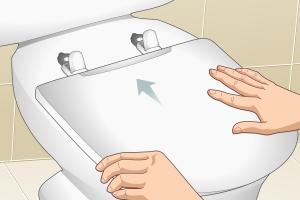Ultimate Guide to Adjusting Soft Close Toilet Seat Hinges for Optimal Performance

-
Quick Links:
- Introduction
- Understanding Soft Close Toilet Seats
- Tools Required
- Step-by-Step Guide to Adjust Soft Close Toilet Seat Hinges
- Common Issues and Solutions
- Expert Insights
- Case Studies
- Conclusion
- FAQs
Introduction
Soft close toilet seats have become increasingly popular in modern bathrooms due to their convenience and noise reduction features. However, like any mechanical component, the hinges can require adjustment over time. This comprehensive guide will help you understand how to adjust soft close toilet seat hinges effectively, ensuring optimal performance and longevity.
Understanding Soft Close Toilet Seats
Soft close toilet seats utilize a hydraulic mechanism that allows the seat to close gently, preventing slamming and reducing noise. Understanding the basic components of this mechanism is crucial for effective adjustments. The primary parts include:
- Hinges: The pivot points that connect the seat to the toilet bowl.
- Hydraulic cylinder: The component that controls the speed of the seat closure.
- Mounting plate: The base that secures the hinges to the toilet.
Tools Required
Before starting the adjustment process, ensure you have the following tools:
- Flathead screwdriver
- Phillips screwdriver
- Adjustable wrench
- Tape measure (optional)
- Lubricant (if necessary)
Step-by-Step Guide to Adjust Soft Close Toilet Seat Hinges
Follow these steps to adjust your soft close toilet seat hinges:
Step 1: Remove the Toilet Seat
Start by removing the toilet seat. Locate the screws at the back of the seat and use the appropriate screwdriver to unscrew them. Lift the seat off the toilet bowl carefully.
Step 2: Inspect the Hinges
Check the hinges for any signs of wear, damage, or loosening. If the hinges are damaged, consider replacing them instead of adjusting.
Step 3: Adjust the Hinges
If the hinges are simply loose, use the adjustable wrench to tighten them. If the soft close feature is not functioning correctly, you may need to adjust the hydraulic cylinder:
- Locate the adjustment knob or screw on the hinge.
- Turn the knob clockwise to increase tension and counterclockwise to decrease it.
Step 4: Test the Adjustment
Reattach the toilet seat and test the soft close feature. Make sure the seat closes smoothly and quietly. If not, repeat the adjustment process.
Step 5: Reinstall the Toilet Seat
Once you are satisfied with the adjustment, securely reinstall the toilet seat, ensuring it is aligned properly with the bowl.
Common Issues and Solutions
Here are some common problems you may encounter with soft close toilet seat hinges and their solutions:
- Seat Slams Down: This may indicate that the hydraulic mechanism is malfunctioning. Adjust the tension or replace the mechanism.
- Loose Seat: Tighten the screws on the hinges to secure the seat in place.
- Uneven Closing: Adjust the hinges to ensure they are at the same height and tension.
Expert Insights
According to plumbing experts, regular maintenance of toilet seats, including soft close models, can significantly extend their lifespan. It is recommended to check the hinges every six months to ensure they are functioning correctly.
Case Studies
Real-world examples show that homeowners who regularly maintain their soft close toilet seats experience fewer issues and longer lifespans for their products. A study conducted by the National Association of Home Builders found that regular checks and minor adjustments can prevent costly repairs later on.
Conclusion
Adjusting soft close toilet seat hinges is a straightforward process that can improve the functionality and longevity of your toilet seat. By following the steps outlined in this guide, you can ensure that your toilet seat remains a quiet and convenient feature in your bathroom for years to come.
FAQs
1. How often should I adjust my soft close toilet seat hinges?
It is recommended to check and adjust your toilet seat hinges every six months to maintain optimal performance.
2. Can I replace the hydraulic mechanism if it fails?
Yes, most soft close toilet seats allow for the hydraulic mechanism to be replaced if it fails.
3. What tools do I need to adjust my toilet seat hinges?
You will need a flathead screwdriver, Phillips screwdriver, adjustable wrench, and possibly lubricant.
4. Why is my toilet seat closing unevenly?
This can be due to misaligned hinges or uneven tension on the hydraulic mechanism. Adjust the hinges to fix this issue.
5. Are soft close toilet seats worth the investment?
Yes, they reduce noise, prevent slamming, and are generally safer for children and pets.
6. Can I install a soft close toilet seat myself?
Yes, most soft close toilet seats come with easy-to-follow installation instructions and can be installed by homeowners with basic DIY skills.
7. What should I do if my toilet seat keeps coming loose?
Tighten the screws on the hinges. If they continue to loosen, consider replacing the hinges.
8. How can I prevent my soft close toilet seat from breaking?
Regular maintenance and careful use will help prolong the life of your soft close toilet seat.
9. Is it normal for the soft close feature to wear out?
Yes, over time, the hydraulic mechanism can wear out, but regular maintenance can help extend its life.
10. Can I adjust the speed of the soft close mechanism?
Depending on the model, some soft close toilet seats allow you to adjust the speed by turning the adjustment knob on the hinge.